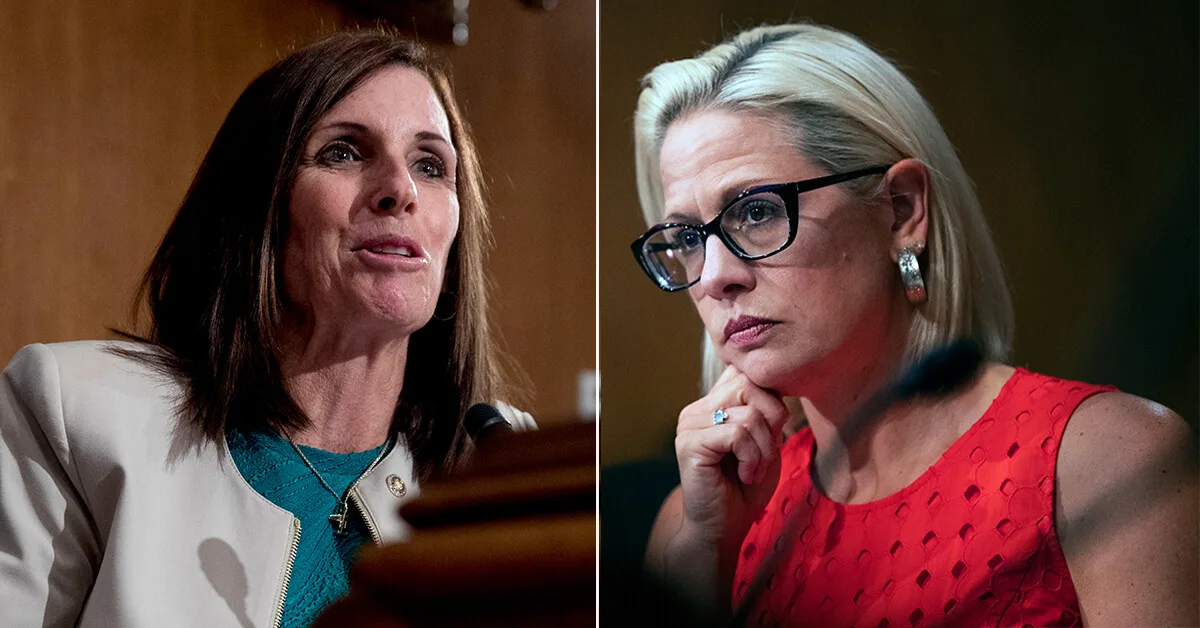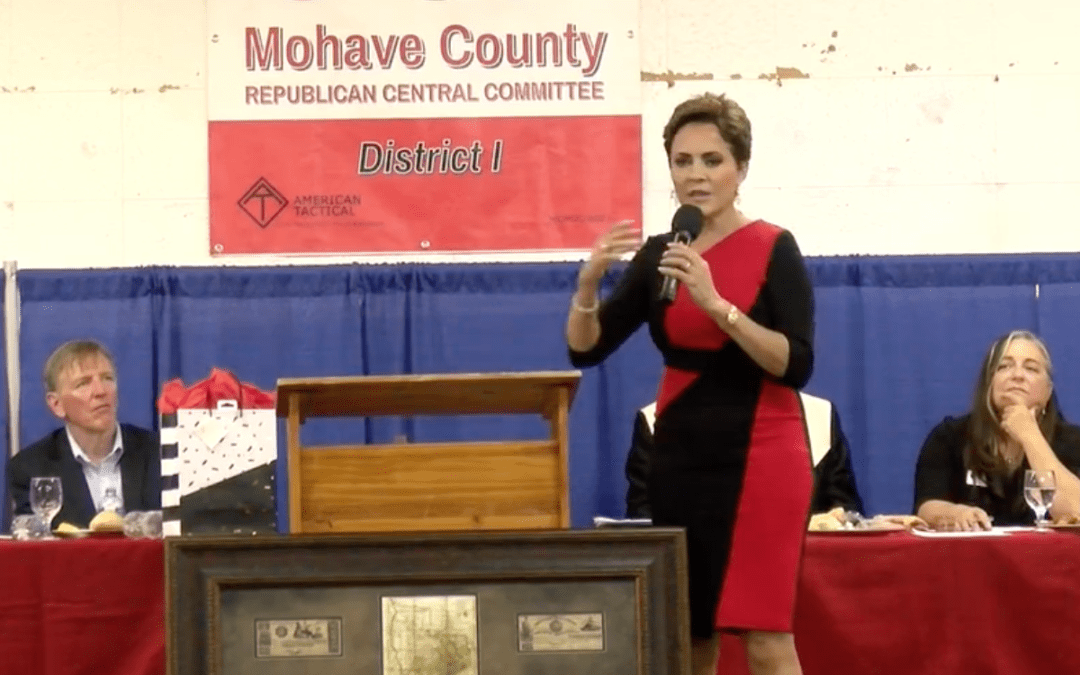
Both Senators are addressing the coronavirus very differently.
In February, Senators Kyrsten Sinema and Martha McSally came together to ask federal officials to develop reimbursement guidelines to help local governments battling the coronavirus. But since the initial act of bipartisanship, their approaches to a national health crisis couldn’t be more different.
The stark contrast in how Sinema and McSally would address the spread of the coronavirus began early. After their bipartisan request in February, both senators made their next public comments in early March. Sinema looked to health experts, while McSally focused on placing blame for the outbreak on China.
“I’d like to acknowledge the Arizona Department of Health Services, the Arizona State Lab, the Maricopa County Department of Public Health, and Arizona State University for their swift actions caring for Arizonans and limiting potential exposure to others in the community,” Sinema said during a Homeland Security and Governmental Affairs Committee hearing. “We need to see the same level of cooperation and coordination on the federal level.”
Days before the hearing, Sinema cosponsored legislation that would allow for larger-scale production of respirators by expanding liability coverage to manufacturers. It was introduced into the Senate, but was never brought to a vote by Senate Majority Leader Mitch McConnell (R-KY).
Instead of looking for local solutions, McSally took an international approach. During a Committee on Banking, Housing and Urban Affairs hearing, McSally claimed the coronavirus was being used by the Chinese government as a way to subvert U.S. power abroad.
“We’re seeing what they’re doing in the military, we’re seeing what they’re doing with supply chains—it’s been highlighted with coronavirus and our pharmaceutical industry,” McSally said in her statement. “We are being played by the Chinese Communist Party. I’m not a fearmonger. This is exactly what’s happening and this is the unclassified version.”
In the weeks since making these remarks, McSally’s efforts to take leadership in a time of crisis have been consistently overshadowed by her senior counterpart in the Senate. During a March 18 interview with Fox Business’s Stuart Varney, McSally laid out the economic plight of low-wage workers and small business owners, but failed to provide any concrete solution.
“So those who are being impacted – those hourly workers, waitresses, the small business owners…I talked to the Flagstaff Mayor. They have companies doing rafting trips in the Grand Canyon,” McSally said.“They are zero customers right now, so we need to help them keep the lights on so that when we get past this, they can open up business again; they don’t go bankrupt.”
That same day, Sinema reached out to the Small Business Administration in Washington D.C., asking them to approve of Gov. Doug Ducey’s request for a disaster declaration. The Administration’s approval would allow small businesses to qualify for Economic Injury Disaster Loans, which are designed to provide business owners with financial support during a crisis.
The request was approved three days after Sinema sent her letter of support.
In an effort to better educate the public on how veterans are being cared for as the coronavirus spreads through the state, McSally visited the Phoenix office of Veterans Affairs on March 13. In her brief overview of her visit on Twitter, she thanked the hospital’s staff for their efforts.
Had she visited a month earlier, she might have run into Sinema, who toured the VA on Feb. 11 to review preparations for handling coronavirus patients. The visit was part of a follow-up, after Sinema and five other senators sent a letter to VA officials asking detailed questions regarding their preparations for the virus.
“Given the emergent nature of the virus,” the Feb. 6 letter states, “we want to ensure that veterans and the dedicated staff can count on the VA healthcare facilities to be fully prepared for prevention, diagnosis, and response efforts.”
In addition to relieving health care costs for veterans, Sinema introduced legislation earlier this month aimed at lowering costs for deductibles found in insurance plans. When the proposal was announced on March 11, patients tested for coronavirus were reportedly charged thousands. Health experts expressed concern that the 44 million Americans with high deductibles and other out-of-pocket costs might forego testing due to its cost.
Many insurance companies have since announced that they have removed deductibles and copayments from coronavirus testing.
Testing costs for patients on Medicare and Medicaid have also been waived in an attempt to make the test more accessible. But the move could be undercut by an upcoming Supreme Court case that could repeal the Affordable Care Act. More than 13 million people enrolled in Medicaid through the ACA’s expansion of the program would be at risk of losing coverage.
McSally has avoided commenting on the upcoming court case, but has been a staunch opponent of the ACA since it was signed into law ten years ago. Her first vote to repeal the health care law was in 2015, and has been criticized by Sinema for votes that strip health care from millions of Arizonans.
The distance between Sinema and McSally’s bipartisan efforts grew further apart last weekend, when the two made opposing votes regarding the $1.6 trillion coronavirus relief package. McSally, who voted in favor of the bill, accused House Majority Leader Nancy Pelosi (D-CA), of being the reason the bill failed.
However, Sinema, in explaining her opposition to the bill, criticized the legislation, calling its introduction nothing more than a political charade.
“Lives are at stake. We need a strong, bipartisan package that will quickly pass the Senate and House and immediately help in the fight against COVID-19,” Sinema said in a statement. “We only just received this bill and it will not pass the House. There is no time for partisan games.”
The bill, which largely favored financial incentives to corporations over individuals impacted by the coronavirus, was replaced on Tuesday with a new relief proposal. The new package includes more provisions for hospitals, added oversight for industry subsidies, and additional funds for states.
Politics

Kari Lake calls on Arizona county sheriffs to enforce 1864 abortion ban
Republican candidate for US Senate Kari Lake on Saturday seemed to solidify her support for Arizona’s total abortion ban and called on county...

VIDEO: Arizona Rep. Greg Stanton ‘We will not stay silent’ on abortion ban
@coppercourier "Under this extreme law, women will die, and their doctors and nurses will be criminalized. This cannot stand," Rep. Greg...
Local News

6 terrifying things that could happen if the Comstock Act is used to target abortion
Does 1873 sound like a really, really long time ago? Well, that’s because it is—but if Republicans and far-right anti-abortion activists have their...

ASU football slapped with probation due to violations during Herm Edwards era
The violations described in the NCAA statement include impermissible in-person recruiting contacts while the state of college athletics was...





